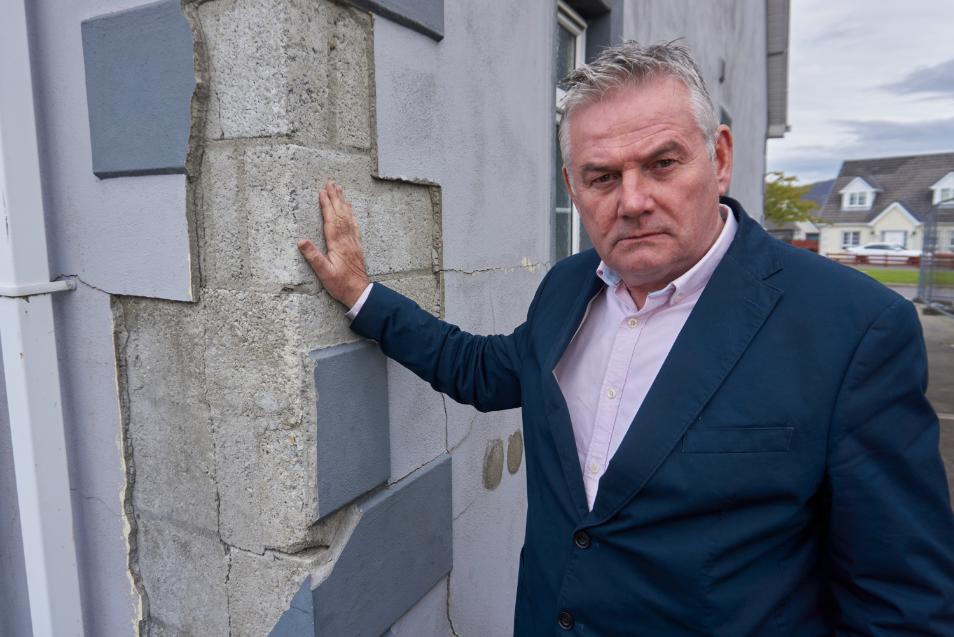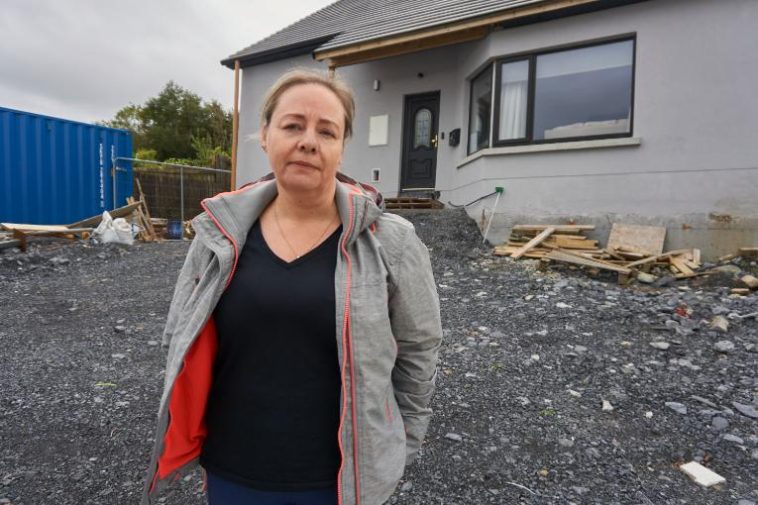TG4 investigates Ireland’s defective blocks crisis as experts call for demolition, while the Housing Agency opts for cheaper repairs.
In this article we cover:
- What are defective blocks
- Why demolition is the best option
- Housing Agency decisions to downgrade applications so that homes are repaired instead
- How much affected homeowners are getting to fix their homes
- How much it’s costing affected homeowners to rebuild their homes from scratch
- Expert recommendations
- Call for revised standards
A TG4 investigation has revealed that full demolition is the only reliable solution for the thousands of homes affected by defective blocks, according to one of the world’s leading concrete erosion experts. However, the Housing Agency has downgraded many applications under the government’s enhanced Defective Concrete Blocks Grant Scheme, opting for cheaper, less comprehensive repair options in place of total demolition.
The enhanced Grant Scheme, aimed at affected homeowners in Clare, Donegal, Limerick, and Mayo, could apply to as many as 7,000 homes. However, defective block damage has been found in 13 counties, with fears every county in Ireland is affected.

Dr Andreas Leemann, a scientist from the Swiss Federal Laboratories for Materials and Science Technology, explained to Iniúchadh TG4 that partial remediation, such as replacing the outer leaf of affected homes, fails to address the underlying damage caused by defective blocks.
According to Dr Leemann, who carried out forensic analysis on blocks from infected homes in Donegal and Mayo as part of international research being managed by Geological Survey Ireland, the mineral pyrrhotite, rather than mica or pyrite, is the true cause of the deterioration and eventual collapse.
“Mica is very easy to spot in the aggregates and probably this led to the assumption that mica is responsible for the deterioration of the blocks. This is nonsense of course. The problem is caused by pyrrhotite in the blocks and it starts to oxidise or rust. When pyrrhotite rusts, it releases sulphur in the form of sulphuric acid, and this causes internal sulphate attack. It’s a natural reaction that occurs so your blocks are expanding. At an advanced stage of the reaction the concrete crumbles and you can take it apart by hand,” says Dr Leeman.
Dr Leemann’s views clash with recent decisions by the Housing Agency, which decides on repair options and grant amounts under the scheme, which has an estimated cost of between €2.5 to €3.5bn.
Under the terms of the government’s scheme, the specific amount granted to homeowners varies from home to home, depending on the determination made by the Housing Agency subject to an overall grant cap of €420,000 but this is expected to increase.

Iniúchadh TG4 tracked down one of the first homeowners to avail of the new scheme, Linda Claxton, from Westport in County Mayo. She was awarded €193,333 under the scheme, but after certain costs were deducted, she said he was left with €140,000 to build a new home, and ended up spending €90,000 of her own money to bridge the cost.
“This is a horrendous journey. I don’t envy anyone coming behind me having to do this. I have put €90,000 towards this. I went to banks to ask for a loan and was refused. In the end my partner got a loan for me,” Ms Claxton says.
Linda was awarded €193,333 under the scheme to rebuild her home, but after costs were deducted, she was left with €140k and ended up spending €90k of her own money to bridge the gap.
One third of the applications to repair homes with defective blocks in Co Donegal transferred over from the old scheme have been downgraded by the Housing Agency from total demolition to other, often cheaper, forms of remediation.
Latest figures supplied to Iniúchadh TG4 show that of the 353 determinations made by the Housing Agency up to the end of September, 215 were the same as the applicant’s engineer, 15 were for a higher degree of remediation while 120 resulted in the original engineer’s recommended level of repairs being reduced.
Most of the 120 downgrades (106) are from the most expensive option of total demolition to other often cheaper forms of remediation that include retaining certain amounts of the existing blockwork.
Letterkenny campaigner Róise Ní Laifeartaigh from the Mica Action Group, whose own home is infected with defective blocks, told the programme she fears homeowners are being offered lower levels of remediation to save money. Speaking in Irish, she says, “It seems, there is, probably, a mindset there from the State to save money and we think that is what is behind the downgrading that is going on.”

In a statement to the programme, the Housing Agency denied suggestions from some homeowners campaigning for 100 per cent redress that the original engineers’ reports to demolish houses had been downgraded to save money.
Asked if this was the case, a Housing Agency spokesperson states, “No. The Housing Agency engages chartered engineers, who are members of Engineers Ireland, to provide appropriate remediation option recommendations in accordance with Irish Standard 465:2018.”
Irish Standard 465 is a testing protocol that was developed in Ireland at the request of the government to assess and categorise the damage to dwellings and aid in the selection of an appropriate remedial solution.
Pyrrhotite is not included in IS standard 465, which is currently under review, but the new enhanced compensation scheme announced by the Government stated that the Housing Agency will “in their analysis and deliberations take into consideration the presence of pyrrhotite.”
Until pyrrhotite is formally included into a new revised standard for assessing damaged homes, the director general of Engineers Ireland, Damien Owens, the body representing engineers told the programme that the Housing Agency should only proceed with recommendations for full demolition.
He says, “Where option one, which is complete demolition, is recommended, I think they should proceed with that. If it’s other options other than demolition, prudence would say they should be paused at this time.”
“They were looking for mica and pyrite, and they may not have been looking for pyrrhotite. So how can the Housing Agency make a decision on pyrrhotite if there is no mention of it (in an engineer’s report),” says Mr Owens.

The TG4 investigative programme, airing tomorrow night, November 6, at 9:30 pm, will spotlight the financial strain on homeowners as well as the limitations of the current scheme.









